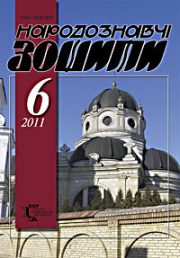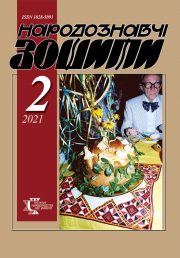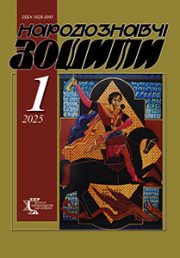The Ethnology Notebooks. 2024. № 4 (178), 733—739
UDK [94(477):572:39(=161.2)]:001.891-057.4С.Сегеда
DOI https://doi.org/10.15407/nz2024.04.733
UDK [39-057.4(477)”19/20″:929]:001.891
SOKIL Hanna
- ORCID ID: https://orcid.org/0000-0002-8352-2124
- Doctor of Philological Sciences, Professor,
- Ivan Franko National University of Lviv,
- Department of Ukrainian folkloristics,
- 1,Universytetska Street, 79000, Lviv, Ukraine,
- Contacts: e-mail: gan.sokil@gmail.com
Abstract. This article is relevant because this year there will be anniversaries for both scholars — Hryhorii Demian would have turned 95, and Vasyl Sokil is turning 70. The object of the research of this publication is the scientific relationship between these folklorists, and the subject is the early stage of V. Sokil’s scientific work, his challenging path to postgraduate studies during the totalitarian regime of Soviet power, as well as his first steps of work at the Lviv branch of the M.T. Rylsky Institute of Art Studies, Folklore, and Ethnography of the Ukrainian SSR Academy of Sciences (since February 3, 1992 — the Ethnology Institute of the National Academy of Sciences of Ukraine). In this research, the author aims to show the atmosphere in which those Ukrainians who chose the desire to serve their national culture had to live and work under the occupation regime. Essentially, the path to science was closed to them, and any attempts to express their national position or opinion were persecuted.
The article emphasizes the assessment of V. Sokil’s scientific work made by H. Demian on the occasion of Sokil’s 40th anniversary, revealing the conditions for forming his worldview, scientific, and national positions. Also, the work on the study of toponymic prose, a field he was one of the first to explore in Ukraine has been analyzed. By that time, his collection of toponymic legends and tales «Pysana Kernytsia» had been published, and his monographic research «Folk Legends and Tales of the Ukrainians of the Carpathians» was approved for publication by «Naukova Dumka» Publishing House. It is highlighted that the researcher conducted his folklore studies of folk legends and tales systematically and comprehensively, starting from recording texts to publication, scientific, and theoretical comprehension. As a professional researcher, V. Sokil adhered strictly to the developed scientific principles from the very beginning of his activity. He developed criteria for distinguishing non-fairy tale prose terminology, justified the use of name variants, initiated genre classification, and identified the main thematic cycles and motifs. This publication was prepared based on the articles published in the local press and materials from the family archive. The research methods applied include biographical, statistical, chronological, and systematic.
Keywords: folklore, legends and tales, expedition, researcher, publications, national culture.
Received 1.07.2024
REFERENCES
- Demyan, G. (2004). A family of scientists-folklorists. Liberation path (Book 4, pp. 119—122) [in Ukrainian].
- Pavlyuk, S. (2014). The great mission of a scientist. Ethnology notebooks, 4, 639—641 [in Ukrainian].
- Koval, G., & Sokil, V. (Ed.). (2018). Sokil Vasyl Vasyliovych. Ukrainian folklore encyclopedia (Pp. 675—677). Lviv [in Ukrainian].
- Musketik, L. (2019). Sokil Vasyl Vasyliovych. Ukrainian Slavic folkloristics (19th — early 21st centuries). Encyclopedic dictionary (Pp. 240—241). Kyiv: Issued by IMFE [in Ukrainian].
- Dmytrenko, M. (2024). Ukrainian folkloristics of the beginning of the 21st century: Development trends. Personnel. Monograph. Zhytomyr: Ruta [in Ukrainian].
- Sokil, V., & Sokil, H. (1998). Folklore materials from the homeland. Lviv: Institute of Ethnology [in Ukrainian].
- Sokil, V., Sokil, G., Koval, G., & Sokil-Klepar, N. (2024). From Makivka lokaliti to science. Life and work of Hrigorii Demian (Pp. 338—339).Lviv [in Ukrainian].
- Kovalchuk, M.I. (1980). Near living springs. Folk creativity and ethnography, 5, 84—85 [in Ukrainian].
- Orkush, M., & Tverdovska, M. (1983, August 27). Folklore of Prykarpattia. Soviet word. Drohobych [in Ukrainian].
- Demyan, G. (1994, October 11). The Carpathian Falcon «eagles» from the KGB were not afraid. For a free Ukraine (P. 2) [in Ukrainian].






